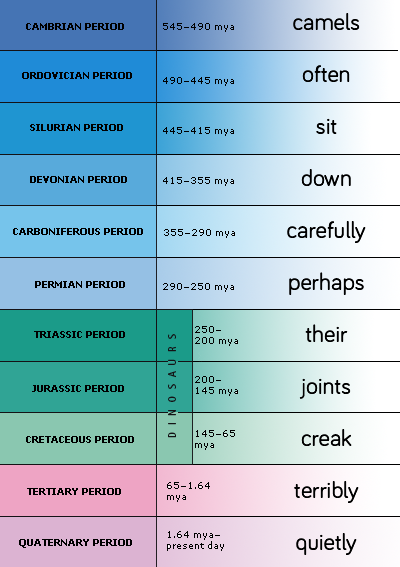With exam season upon us, we thought we would help you guys out a little bit with a useful piece of procrastination – revision tips backed up with scientific research!
1. Don’t keep re-reading – test yourself!
Most scientific models of how memory works agree that we have a short term and long term memory. Short term memory can hold 5-9 items whereas long term memory has a much greater capacity but not everything we see, hear or read ends up there. To help embed things in our long term memory it helps to rehearse them and practice retrieval too. This means that whilst re-reading the same notes over and over again will help rehearse them, it is also important to test yourself to see how much of it you can remember to be sure you can retrieve these memories when you need them.

2. Use Mnemonics
Mnemonics are a technique used to help remember things by association. For example you might have learnt the order of the colours of the rainbow with the phrase “Richard Of York Gave Battle In Vain” with the first letter of each letter corresponding to the first letter of the colour it represents. So it translates to red, orange, yellow, green, blue, indigo, violet. Or maybe you learnt the compass points with “Never Eat Shredded Wheat”.
If you have to remember things in a certain order for your exam, making up a mnemonic like this can be a great way to help you. Mnemonics work by creating more meaningful associations and giving you cues to help you retrieve the information from your long term memory. Researchers Shetty and Srinivasan looked into the study skills of 137 Dental students and found that the use of mnemonics were associated with higher exam scores.
Here’s a mnemonic to help you remember the geological time periods:

If you use mnemonics to aid your revision, comment and let us know what they are – you might be able to help someone else out too!
3. Don’t rely on cramming
It’s a classic scene – just before you’re about to enter an exam, everyone is sat around stressing over their textbooks and flicking through sheets of scruffy notes trying to get in some very last minute revision. Is this really helpful? Studies have shown that you can generally hold, on average, 7 things in your short term memory and this fades after 30 seconds if not rehearsed and committed to long term memory. Therefore it’s unlikely you’ll remember much of what you read waiting outside the hall after you have taken your seat and read the question.
It’s much better to manage your time to allow yourself to cover everything you need properly and get it into your long term memory before the day of your exam!

4. Use Chunking
Despite the fact I have just said you can only remember around 7 things in short term memory, you can probably remember a phone number or a couple of post codes for 30 seconds right? This is because, whether you notice it or not – that information is chunked, making it much easier to remember. This is why phone numbers are usually displayed with a gap after three or four numbers and why post codes are in two parts.
Chunking, or separating your revision into relevant sections can help you digest everything and remember it more easily. If you can create links between different bits of information and put them in meaningful categories it can help you to recall the relevant information in your exams.
